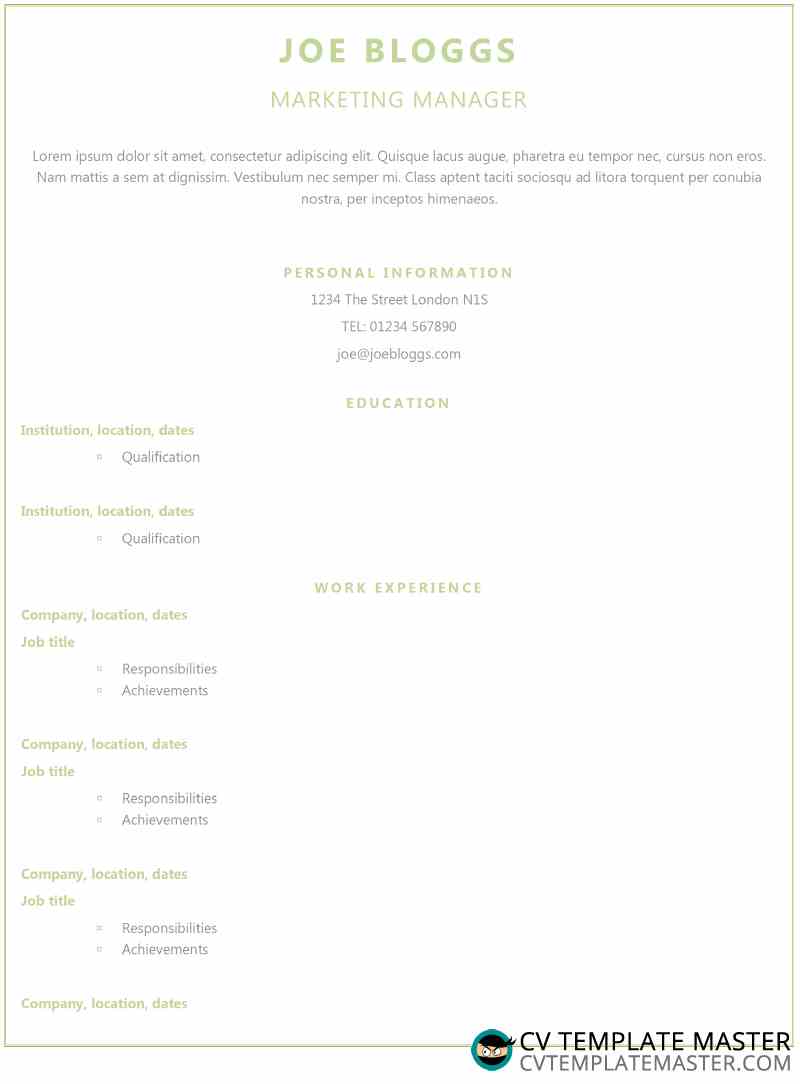Template details:

Don’t make these common CV mistakes
In a world dominated by professional CVs it only takes one mistake to create doubt in the mind of the employer. Even just the one spelling mistake could result in receiving a rejection email. Knowing what mistakes to avoid when writing a CV will give you a huge advantage, and provide you with a much better shot at success.
Here are a few popular examples of mistakes and how to avoid them…
A lack of research
If you write your CV without conducting any research into the role and the business, you are going to end up with a generic CV. Instead, tailor your CV based on your research of what the employer is looking for in a candidate. The first place to look is the job advert itself as it will reveal most of what you need to begin writing your CV.
What skills and qualifications are they looking for?
What experience is required, or could be used on your CV?
What keywords are used within the job advert?
Another great way to get an idea of what the employer is looking for is to research the company – this could be through their website for example. Most businesses also have a few social media pages – Facebook and Twitter for instance. You can find a lot of helpful information from these pages, and they can give you a far greater chance of writing a CV that matches the company’s culture and aspirations for the future.
Tip – write a CV that demonstrates your industry knowledge and commercial awareness. Read the news and keep up to date with what’s happening in your chosen sector.
You may also find these articles helpful –
What skills are employers looking for in a school leaver?
Too much waffle
Recent and/or relevant roles will be read in depth by the employer, so it makes sense to ensure they are easy to navigate and structured correctly. A common mistake is to piece together everything in one long paragraph, however it would be much better if you create bullet points so each important piece of information can be read and acknowledged quickly.
Each of your past jobs should start with a brief introduction of the company, followed by a job title and what your role within the company is or was. Your responsibilities and tasks can then be bullet pointed underneath, making the whole structure easy to follow.
Tip – highlight outstanding achievements and results for your previous roles that the employer would be interested in. Extra information within your employment history will further demonstrate your abilities. Provide examples of problem solving, great communication skills, sales targets, promotions, and so on.
Too many clichés
Apart from spelling and grammatical errors, one of the most common mistakes are job seeker makes is to write a CV with too many cliché statements. ‘Great communicator’, or ‘Fantastic team player’. No matter how impressive this may sound the employer has no reason to believe this is true. It would be very unwise to assume that the hiring manager will read your bold claims and trust every word you say.
Don’t use a cliché statement without backing it up with a performance indicator. As stated above, you should always provide examples of your achievements and past performance with numbers, graphs, sales stats, and whatever you feel is relevant to the employer. If you are applying for a customer service based role, then communication and the ability to solve problems are vital soft skills to have. Think back to a time when you had to help a customer who was having a difficult time, and explain how you handled it.